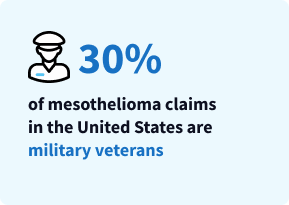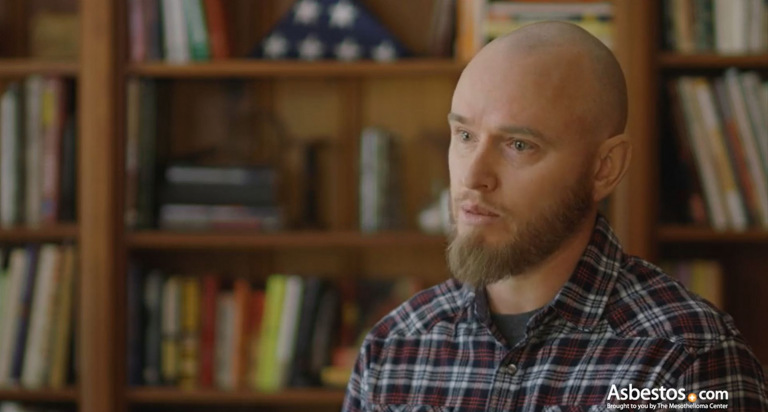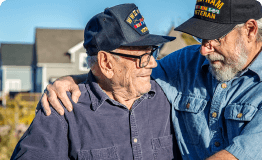Mesothelioma & Veterans
About 30% of annual mesothelioma claims come from veterans. You might have a high risk of asbestos exposure if you served in military occupations from 1930 to 1980. Every branch of the military relied on asbestos. VA benefits are available to veterans with mesothelioma.
Written by Aaron Munz • Edited By Walter Pacheco • Veterans Review By Nathan Pinner
Asbestos.com is the nation’s most trusted mesothelioma resource
The Mesothelioma Center at Asbestos.com has provided patients and their loved ones the most updated and reliable information on mesothelioma and asbestos exposure since 2006.
Our team of Patient Advocates includes a medical doctor, a registered nurse, health services administrators, veterans, VA-accredited Claims Agents, an oncology patient navigator and hospice care expert. Their combined expertise means we help any mesothelioma patient or loved one through every step of their cancer journey.
More than 30 contributors, including mesothelioma doctors, survivors, health care professionals and other experts, have peer-reviewed our website and written unique research-driven articles to ensure you get the highest-quality medical and health information.
About The Mesothelioma Center at Asbestos.com
- Assisting mesothelioma patients and their loved ones since 2006.
- Helps more than 50% of mesothelioma patients diagnosed annually in the U.S.
- A+ rating from the Better Business Bureau.
- 5-star reviewed mesothelioma and support organization.
Testimonials
My family has only the highest compliment for the assistance and support that we received from The Mesothelioma Center. This is a staff of compassionate and knowledgeable individuals who respect what your family is experiencing and who go the extra mile to make an unfortunate diagnosis less stressful. Information and assistance were provided by The Mesothelioma Center at no cost to our family.LashawnMesothelioma patient’s daughter
How to Cite Asbestos.com’s Article
APA
Munz, A. (2024, April 17). Mesothelioma & Veterans. Asbestos.com. Retrieved April 18, 2024, from https://www.asbestos.com/veterans/
MLA
Munz, Aaron. "Mesothelioma & Veterans." Asbestos.com, 17 Apr 2024, https://www.asbestos.com/veterans/.
Chicago
Munz, Aaron. "Mesothelioma & Veterans." Asbestos.com. Last modified April 17, 2024. https://www.asbestos.com/veterans/.
- Every branch of the military used asbestos. Navy veterans were among the most at risk of exposure.
- Veterans may file VA claims for compensation and access VA health care for mesothelioma.
- Many veterans also receive compensation through legal settlements.
- A VA-accredited claims agent can help answer questions about VA disability.

Why Veterans Get Mesothelioma
Veterans are at a higher risk for mesothelioma. The military employed the widespread use of asbestos between the 1930s and 1980s. Many valued the material for its heat-resistant properties. Asbestos was present in everything from insulation to shipbuilding. Each branch of the military used asbestos in different ways:
- Army: Asbestos was used in barracks, vehicles and planes.
- Navy: Boilers, steam pipes and turbines used in shipbuilding contained asbestos.
- Air Force: Asbestos was present in plane engines, brakes and insulation.
- Marines: Barracks, ships and vehicles all contained asbestos.
Those in the Navy were particularly at risk. Shipbuilding and maintenance required large quantities of asbestos. Veterans who worked in shipyards faced significant asbestos exposure.
15,245
Number of U.S. veterans we’ve helped since May 2017.
42.8%
Percentage of patients we’ve helped who are Navy veterans.
After leaving the military, veterans may continue to face asbestos exposure from other sources. Certain occupations or hobbies, such as car restoration, have a link to asbestos. Additionally, family members of veterans may have come into contact with asbestos secondhand.
Veterans are heroes who risked their lives to protect our country. Many who served experienced asbestos exposure in the military and developed mesothelioma. They deserve the benefits and support available to them.

Types of Veterans Benefits for Mesothelioma
As a veteran with mesothelioma, you may be eligible for 100% disability compensation. This compensation is available through the U.S. Department of Veterans Affairs. You may also qualify for health care services and monthly payments.
If you are the surviving spouse of a veteran, you may also be eligible for benefits. One example is dependency and indemnity compensation, or DIC. This benefit is available if your spouse dies due to a disability sustained during their service.
VA Health Care
VA healthcare enrollment depends on the veteran’s income level. You will also need confirmation of an illness connected to your service. The VA considers service-connected mesothelioma if 50% of the asbestos exposure happened on active duty.
Disability Compensation
Disability compensation is a monthly benefit based on a veteran’s level of disability. The VA considers asbestos-related cancers such as mesothelioma 100% disabling. The amount of benefits may change depending on the number of dependents.
Single veterans with mesothelioma qualify for a monthly payment of $3,877. Married veterans receive a monthly amount of $4,098. These rates are based on the Veterans Compensation Benefits Rate Tables, which show different values for various situations.
Special Monthly Compensation
Disabled veterans who rely on another person qualify for special monthly compensation. Payments often range from $4,651 to more than $6,382 a month. This benefit is also available to spouses and parents of veterans.
Rates for special monthly compensation depend on several factors. One example is the number of dependents.
Dependency and Indemnity Compensation
Dependency and indemnity compensation is a monthly benefit. Surviving spouses of a veteran who died from service-related disabilities are eligible. They can receive up to $1,612.75 every month.
An extra monthly payment is available under certain circumstances. Spouses of deceased veterans must file a claim to receive this benefit.
VA Burial Benefits
The VA burial allowance for a death connected to military service is $2,000. A person seeking this benefit must prove they paid for a veteran’s burial or funeral. They also must show that the veteran died of a service-connected disability. Such disabilities include mesothelioma linked to military asbestos exposure. It’s vital to know the requirements for filing a claim.
In order for a veteran to file a service-connected disability claim, a veteran must first prove they have a VA-recognized asbestos-related condition such as mesothelioma.
Who Is Eligible for Veterans Benefits?
To be eligible for VA benefits, start the claim process immediately after diagnosis. You will need asbestos exposure and diagnosis documentation to file a VA claim.
Asbestos.com helped us with getting through the red tape at the VA and getting the necessary forms for us. We would probably still be battling without their help.John ConwayRetired Navy Chief, diagnosed in 2012
Claim processing takes time. It may be easier for family members to get survivor benefits first with a disability claim. Consider the requirements for filing a VA claim:
- Discharge Status. Discharges from active military service under conditions other than dishonorable.
- Exposure Summary. Includes history of military job ratings, locations, etc.
- Medical Documentation. A doctor must provide medical records showing that asbestos exposure caused mesothelioma.
- Medical Evidence. Medical proof that active military duty led to asbestos exposure. The exposure must lead to mesothelioma or another asbestos-related disease.
Once you have met the requirements, seek a VA-accredited claims agent. They can lead you through the process and ensure you receive compensation. A VA-accredited claims agent makes the process easier from start to finish.
Asbestos exposure is a significant risk factor for several diseases. Asbestos-related diseases that qualify for VA benefits include:
- Asbestosis
- Bronchus cancer
- Gastrointestinal cancer
- Interstitial pulmonary fibrosis
- Larynx cancer
- Lung cancer
- Mesothelioma
- Pharynx cancer
- Pleural effusion
- Pleural plaques
- Urogenital cancers (except prostate)
Veterans with mesothelioma should seek help to receive the benefits they deserve. Contact a VA-accredited claims agent to start the claim process.
Treatment for Veterans with Mesothelioma
Veterans with mesothelioma should know that early diagnosis and treatment are essential. Symptoms can take decades to show up after service. If you have symptoms after exposure to asbestos in the military, talk to your doctor. They can tell you about a diagnosis and your options.
If you receive a mesothelioma diagnosis, finding a specialist is critical. The VA has access to some of the top mesothelioma specialists across the United States who can provide the best treatment options for veterans.
I would tell anyone diagnosed to look beyond where they normally would for treatment. There are experts out there who can treat this disease, but you have to find them.Odell R.U.S Navy
The most common treatments for mesothelioma include surgery, chemotherapy and radiation therapy. The VA offers these treatments to eligible veterans. They can also assist with travel arrangements and cover the cost of airfare and housing.
The Veterans Choice Program allows eligible veterans to receive care outside the VA. A veteran living more than 40 miles from the nearest VA facility may be eligible. The same is true if you cannot get an appointment within 30 days. Veterans should talk to their VA doctor about their options.

What to Do Next
Learning that military asbestos exposure can lead to cancer can be upsetting. It’s essential to take action if you have symptoms. Mesothelioma can take decades to develop, and early action leads to the best outcomes.
- Determine if you had exposure to asbestos in the military.
- If you are experiencing symptoms, tell your doctor and find a specialist. Patient Advocates can locate one in your area.
- If mesothelioma is a possibility, get an official diagnosis.
- Find specialized treatment. The Mesothelioma Center can provide options available through the VA or non-VA options.
- If you’re a caregiver to a veteran with mesothelioma, learn more about how to support them. Caregiver resources are available.
- Explore VA benefits and legal options for you and your family. A VA-accredited claims agent can answer your questions.
- Think about starting palliative care alongside your treatment. If you have a late-stage diagnosis, consider hospice care.
The Mesothelioma Center helps veterans and their families with every step of the process. Our resources can help you navigate the complexities of diagnosis, treatment and benefits. Since 2018, our Veterans Department has helped thousands of vets and their loved ones file a VA claim.
If you have an asbestos-related illness from the military, know you are not alone. Many veterans faced exposure and were not informed, but there is hope. There are resources and support available to help you through this difficult time.
I’m an ex-Marine and I’ve already beaten the odds. I was given six months to a year to live six years ago. It’s important that people understand there is hope.
Commonly Asked Questions From Veterans With Mesothelioma
- Is mesothelioma a VA disability?
-
If the majority of a veteran’s lifetime exposure to asbestos occurred on active duty, the VA can approve a mesothelioma diagnosis as a service-connected disability for benefits.
Answered By: Aaron Munz, Director of Veterans Department & Former U.S. Army Captain
- What is the VA Disability Rating for mesothelioma?
-
If the cancer is determined to be service-connected, the disability rating will be 100% as long as the cancer is active and for six months following the final treatment.
Answered By: Aaron Munz, Director of Veterans Department & Former U.S. Army Captain
- Are there any resources specifically for veterans with mesothelioma?
-
Veterans may qualify for VA Disability Compensation and VA health care if military service caused or worsened their health conditions. Veterans’ families can stay at Fisher House homes while a veteran is in the hospital receiving medical care.
Answered By: Aaron Munz, Director of Veterans Department & Former U.S. Army Captain










